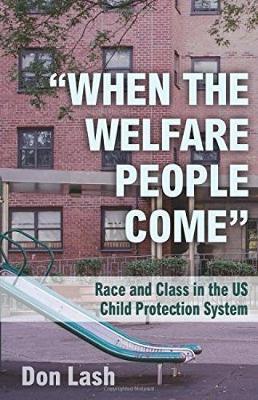When the Welfare People Come: Race and Class in the Us Child Protection System

When the Welfare People Come: Race and Class in the Us Child Protection System
Malcolm X, describing his childhood experience of "when the welfare people came" and introduced him to the US child protection system, called it "legal, modern slavery--however kindly intentioned." That shocking characterization obscures some of the complexities of the state response to childhood poverty, but it reflects sentiments that are common among communities of color, where child welfare investigations are most concentrated. A radical assessment of institutional racism in the child welfare system is needed now more than ever. In this sweeping look at the history and politics of the US child welfare system, "When the Welfare People Come" exposes the system--from the "orphan trains" and Indian boarding schools to current practices in child protective investigations, foster care, and mandated services--arguing that it constitutes a mechanism of control exerted over poor and working-class parents and children. Don Lash reveals the system's role in the regulation of family life under capitalism and details the deep and continuing consequences of what happens "when the welfare people come." Including first-person vignettes of parents, children, and workers in the US child protection system, Lash also offers practical and cogent ideas for its improvement and transformation.
Malcolm X, describing his childhood experience of "when the welfare people came" and introduced him to the US child protection system, called it "legal, modern slavery--however kindly intentioned." That shocking characterization obscures some of the complexities of the state response to childhood poverty, but it reflects sentiments that are common among communities of color, where child welfare investigations are most concentrated. A radical assessment of institutional racism in the child welfare system is needed now more than ever.In this sweeping look at the history and politics of the US child welfare system, "When the Welfare People Come" exposes the system--from the "orphan trains" and Indian boarding schools to current practices in child protective investigations, foster care, and mandated services--arguing that it constitutes a mechanism of control exerted over poor and working-class parents and children. Don Lash reveals the system's role in the regulation of family life under capitalism and details the deep and continuing consequences of what happens "when the welfare people come." Including first-person vignettes of parents, chi
PRP: 117.80 Lei
Acesta este Prețul Recomandat de Producător. Prețul de vânzare al produsului este afișat mai jos.
106.02Lei
106.02Lei
117.80 LeiLivrare in 2-4 saptamani
Descrierea produsului
Malcolm X, describing his childhood experience of "when the welfare people came" and introduced him to the US child protection system, called it "legal, modern slavery--however kindly intentioned." That shocking characterization obscures some of the complexities of the state response to childhood poverty, but it reflects sentiments that are common among communities of color, where child welfare investigations are most concentrated. A radical assessment of institutional racism in the child welfare system is needed now more than ever. In this sweeping look at the history and politics of the US child welfare system, "When the Welfare People Come" exposes the system--from the "orphan trains" and Indian boarding schools to current practices in child protective investigations, foster care, and mandated services--arguing that it constitutes a mechanism of control exerted over poor and working-class parents and children. Don Lash reveals the system's role in the regulation of family life under capitalism and details the deep and continuing consequences of what happens "when the welfare people come." Including first-person vignettes of parents, children, and workers in the US child protection system, Lash also offers practical and cogent ideas for its improvement and transformation.
Malcolm X, describing his childhood experience of "when the welfare people came" and introduced him to the US child protection system, called it "legal, modern slavery--however kindly intentioned." That shocking characterization obscures some of the complexities of the state response to childhood poverty, but it reflects sentiments that are common among communities of color, where child welfare investigations are most concentrated. A radical assessment of institutional racism in the child welfare system is needed now more than ever.In this sweeping look at the history and politics of the US child welfare system, "When the Welfare People Come" exposes the system--from the "orphan trains" and Indian boarding schools to current practices in child protective investigations, foster care, and mandated services--arguing that it constitutes a mechanism of control exerted over poor and working-class parents and children. Don Lash reveals the system's role in the regulation of family life under capitalism and details the deep and continuing consequences of what happens "when the welfare people come." Including first-person vignettes of parents, chi
Detaliile produsului










